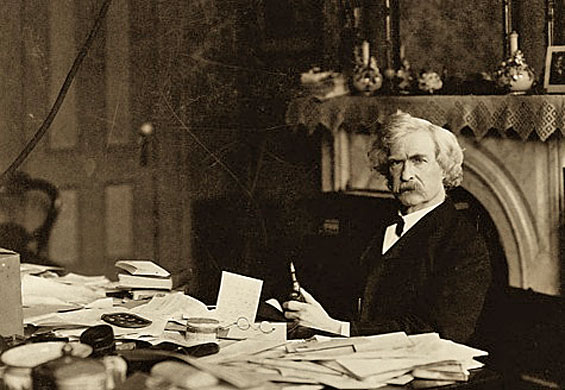A long time ago I performed a 3-minute skit at a mega-church in Washington DC. After the fourth or fifth service, a talent scout approached me, handed me his card, and said, “You, son, are an actor… we should talk… How about Wednesday? I’ll call you.”
That 45-second one-way conversation changed my life for nearly three days. I’m not kidding. Those words—you, son, are an actor—sang over and over in my brain like an annoyingly catchy song. By Sunday evening, I was daydreaming about what my life as an actor would be like, contemplating whether or not I’d be forced to move to New York City or L.A. By Monday afternoon, I had started to describe that short conversation to friends as being my “Road to Damascus” experience, like a calling from God.
By the time the talent scout called me, it was late Wednesday afternoon and I was a nervous wreck. We talked for 7 minutes. He stroked my ego a bit and then he started talking to me about his “amazing acting courses…,” courses that would take my “raw talent” to the next level. Even thought I knew I was being politely swindled, I signed up for his acting courses, partly because I can’t say no but also because I really wanted to believe that I was an actor.
But I wasn’t an actor—not really.
I mean, I’m not horrible when performing in a church skit but that hardly makes me an actor. Of course, the talent scout knew that. But he just needed me to believe that I was an actor long enough to get me to sign up for his $300 acting classes. And it worked.
But that’s one of the woes of being a creative—I turn into a giant sucker anytime somebody, especially a somebody with a fancy title, uses my creative nature as a gateway into my soul which is in close proximity to my wallet.
As a blogger/writer, I can’t help but notice how many “experts” use the same kind of lingo to wield wannabe writers into buying their books or signing up for their courses, they twist the truth just enough to make it seemingly true for all.
There are two lies that I see most of all.
The first lie is this one: “YOU ARE A WRITER!”
That’s a lie. The truth is YOU MIGHT BE A WRITER. Or YOU’RE PROBABLY NOT A WRITER.
Because the truth is 98 percent of us are not writers. It doesn’t matter that we feel like writers or that somebody who writes tells us that we’re writers—we’re probably not writers. And that’s okay.
Now, the reasons why most of us aren’t writers vary: Some of us can’t write. Some of us shouldn’t try to write. Some of us feel like writers but aren’t capable of constructing complete sentences. Some of us have nothing to write about. Some of us have the chops—that is, we’re technically capable of written communication—but we lack any unique voice or passion or work ethic or good idea. The reasons why 98 percent of us probably aren’t writers goes on and on and on.
And again, that’s okay. We don’t have to be writers. Probably not being a writer doesn’t mean we shouldn’t blog or journal or purchase Moleskine notebooks. It simply means we’re probably not a writer, at least, not in the way we might have hoped or have been told.
The second lie is this one: “YOUR STORY IS ENOUGH!”
Or “All you need is your story.”
Or “Your story is a powerful tool—use it well!”
Or “Just tell your story! The world will listen.”
I really wish this were true. I really wish that all we needed was our story to make people interested in what we have to say or do or write. But it’s not true—not for 98 percent of us. There was a time when I wished that all of our stories were the kind of stories worthy of books or well-known blogs or TED talks. But honestly, considering how heartbreaking and difficult those kinds of stories usually are, that’s a terrible wish. Most stories that get written in books or read by millions on blogs are the kind of stories that nobody should wish on anybody—there filled with struggle and death, loss and hardship, depression and disease—those stories are lived every day but they usually aren’t the stories that people hope they live.
But for the most part, the majority of our stories are all pretty unspectacular, just everyday kind of stories of common struggles or experiences that aren’t bad or boring, just not the kind of stories that most people really want to read about because their too similar to the stories they/we are living.
In order for most of us to be able to use our ordinary stories, we must have a secondary ability—we must be able to tell our stories in a way that makes people laugh or utilize our stories in a way that helps people learn something useful or compound our stories with the stories of other people in order to inspire.
That our stories are likely not enough to make us the most interesting people in the room is okay, too. While it goes against our culture’s obsessiveness with individualism, the truth is, most of us aren’t Moses. Sure, that’s not a sellable truth. That truth won’t sell books or classes or get you to sign up for conferences. But nonetheless, it’s indeed true. It’s the realities that 98 percent or more of us are living every single day. And that’s okay.
Still, today we are inundated with people who tell us that we are all writers with profound stories that we must tell the world about. Because that’s what we’ve been trained to want to hear. That’s because that’s the kind of message that sells books and ideas and it’s the kind of message that builds platforms and fills up auditoriums.
Neither of these lies means that we should stop writing or stop telling our stories. It just means we might need to edit our expectations, to live in the truth that is true for 98 percent of us.
Viagra is for the treatment of inability to get or keep an hard-on and similar states when hard-on is of low quality. When you buy remedies like cialis from canada you should know about cialis online canada. It may have a lot of brands, but only one ATC Code. Erectile dysfunction, defined as the persistent impossibility to maintain a satisfactory hard-on, affects an estimated 15 to 30 millions men in the America alone. Sexual health is an substantial part of a man’s life, no matter his age etc.






Standing ovation here in Columbus! But you forgot the sales pitch at the end for your 16-week e-course that will help hopefuls determine once and for all if they really are writers!!!
Two words: VIDEO SERIES.
Or you could just get on Tumblr/Pinterest and follow writing blogs. They aren’t hard to find and are completely free. If there’s one thing I learned in journalism school, it’s that writers read and writers write. Just do it, study it, live it. If you want it enough to make it your entire life, you are a writer. You may not be a published writer, a successful writer or an awarded writer, but nothing can take away that name. If you give it everything, you are a “writer,” even if that’s not your day job, even if you don’t make a cent. Even if it means getting a blog or writing fanfiction or drafting a hundred novels that never sell. I have way more respect for someone who sacrifices for their writing, who pours their heart into each word, than any of those “best-seller” authors who buy their way onto lists with ghost-written books with their face plastered on the front. No, keeping a journal or blog doesn’t make you a “writer,” but it will help you get there a lot faster than not.
Don Miller Thank you for saying it, Matthew. Backing away now.
So, so good! Some of the inspirational writer/bloggers out there really ought to be sued for peddling advice for cash.
I like your thoughts here, Matthew but there’s a balance to be struck too. Those who actually do have something to say and the talent to say it are often those the most plagued by self-doubt and the feeling that they’re not a “real” writer.
The only real way to tell if you’re a writer with something worth hearing is to write and write and write and write and just wait and see if anything comes of it. Bring your passion. Bring your blood and sweat. Leave your expectations of fame and glory sitting with your 12 place tetherball trophy.
It’s also worth remembering that even the good writers often go unknown. In fact, some might say that it’s especially the good writers who tend to languish while the charlatans inexplicably succeed. I’m looking at you Dan Brown and E.L. James.
Oh, and for what it’s worth, you’re a damn good writer. And the work you put into it puts most of us to shame.
“Editing our expectations.” Brilliant.
I think writers have to hush the story inside them everyday or write some of it everyday. They are either guilt ridden from not writing or felling accomplished from writing, doubtful anyone will read their stuff or dismissing that thought and writing anyway. It’s a part of who they are on the inside, needing to get out. It’s always been there, not a fad to them but a voice that laziness, insecurity nor outside influences can’t silence. That is my limited opinion.
“…just not the kind of stories that most people really want to read about because their too similar to the stories they/we are living.” My inner spell check siren is blaring.
I teach writing in school. I tell them they are all writers. Let them dream for awhile. Elementary children all tell stories and I believe we all should write, journal how we feel when we feel deeply. I think your point is taken, not everyone has to read it but everyone can write it even if it is only for themselves. People going thru a crisis, a hard time, an emotion, should write it. Writing can clear the head and heal the heart. It is a cleansing of the soul that no one has to read, just the writing can be the cleaning that is needed. This is a common counseling tool to help someone get in touch with a feeling or get rid of it. Please tell people to write. Write down everything, every time I encounter a bug I have a story to tell students and then they can tell me what happened when they encountered a bug. A common enough occurrence that helps kids see their world in a different way. When I ask children to put themselves into a fairy tale they use their imagination to see themselves in a different way. When I ask a child about empathy and compassion and explain in a story and ask if they have ever been kind to someone they see the opportunity to record their own ability to be kind and compassionate and now the world opens up in a different way. When I show them my little notebooks filled with notes and stories and ideas and descriptions they see the ideas and want their own little notebook so they too can write a story! Everything is worth writing about. They love to read their stories. Maybe when they are older they will not be worth reading but everything is worth writing about to the person who is writing…not everyone else has to read it.
I feel very similar. This article seems to me to be very negative and discouraging. New writers regardless of age can learn so much from others who are willing to give. But those that stand on their accomplishments and discourage others to not even try seems like the wrong approach. Everyday we have the ability to create or destroy and this kind of article does the latter. Simply ask yourself if after reading this you feel good or bad. Often people disguise other things in what they term tough love. I found this to be very negative and I have to wonder about the real intent of the author. If you’ve just realized your dream you can tell others and help them achieve their dream or you can tell everyone how they will never achieve what you have. To me it is sad that this kind of article is spread around by writing coaches and others as if it is absolute truth. How many authors did not get published until later in life. This voice of doom does not serve the higher purpose nor is it what I would expect from someone with so many readers.
One published author (I think it was Gene Wolfe) said: “If you are smart enough to be an author, you are smart enough to make more money doing something else.”